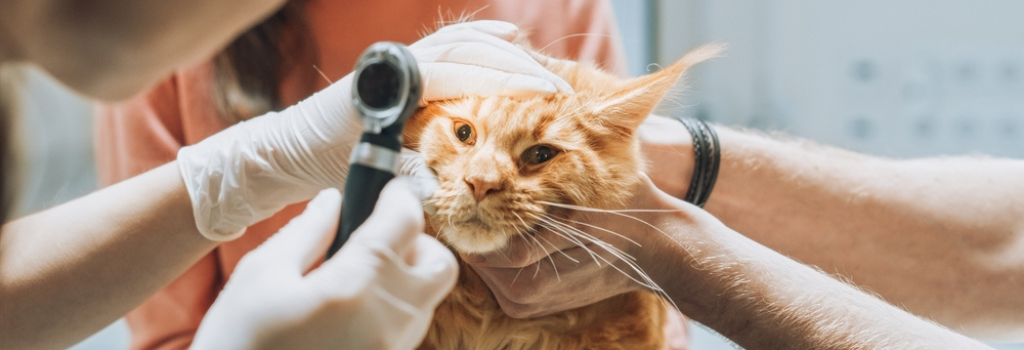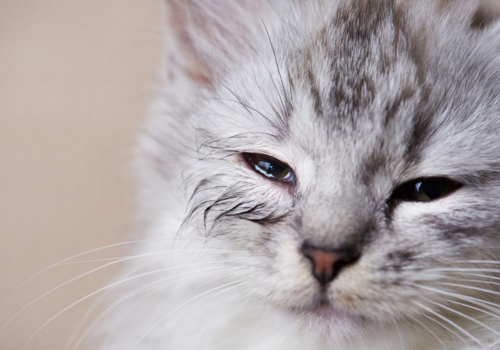Paying close attention to any changes in your cat’s eyes is critically important, as delayed treatment or an incorrect self-diagnosis could ultimately lead to vision loss, blindness, or eye removal. Since eye conditions in cats tend to progress rapidly, a visit to your veterinarian as soon as possible is necessary for the best prognosis. If you’ve noticed eye discharge, redness, cloudiness, or squinting, you might have decided to look online for insight instead of calling your veterinarian. At Briar Patch Veterinary Hospital , we work extremely hard to bring you the accurate information you need, especially with a topic as important as your cat’s vision. We’ve taken FAQs on feline eye care and answered them as thoroughly and accurately as possible, so you have trusted information about this critical topic.
If you’re looking for a highly trained veterinarian in Ithaca, NY, we’d love to see your cat to address any eye issues they’re experiencing, so please call us at (607) 272-2828.
What's the most important thing when it comes to caring for a cat's eyes?
The most important thing about cat eye care is acting immediately if you suspect a problem. Eye issues in cats progress rapidly, making quick action critical to prevent a larger issue and slow down eye disease progression. Cat owners should be paying close attention to their cat’s eyes, with an immediate call to their veterinarian if you notice changes.
How does good eye care impact the health and wellness of my cat?
Vision is critically important to all living creatures, cats included. If your cat ventures outside, experiences a change in their environment, gets startled by something, or needs to defend themselves, poor vision can make all of those situations very stressful. In addition, certain eye conditions can be very painful, diminishing their quality of life if left untreated. Preserving your cat’s vision is vitally important to their mental and physical wellbeing.

What are some signs and symptoms of eye issues in your cat?
There are various signs and symptoms of eye issues in cats, from pawing at them to a change in color.
Signs of an eye issue in cats include:
- Squinting
- Holding their eyes closed
- Pawing at their eyes
- Rubbing their eyes on objects
- Eye discharge
- Swelling
- Redness
- Cloudiness
- Color change
- Inability to see through the cornea to the eye color
- One eye looks different from the other (pupil size or color)
Specific symptoms are usually correlated to a particular eye condition. For example, eye discharge, crustiness, redness, and tearing are often signs of infection. Cloudy eyes with a bit of white in front of the eyes are almost always an indication of cataracts or corneal problems, while Glaucoma is painful and sometimes causes bulging eyes. Allergies come with a lot of tearing, discharge, and sneezing. Uveitis is an uncomfortable eye condition, with cat owners noticing a slight haziness to the eyes and squinting and blinking in bright light.
How soon should you bring your cat in to see a veterinarian for a problem with vision or other eye problems?
As soon as you suspect an eye problem in your cat, address it immediately by making an appointment with your veterinarian. It’s common for a cat owner to think that waiting a week or two to see if the problem resolves itself is acceptable, but a week is a long time since eye disease can progress very rapidly. Bring your cat in for an examination as soon as your veterinarian has an opening available. Your veterinarian may also recommend that you take your cat to an emergency hospital and not wait.
How will a veterinarian diagnose a problem with my cat's eyes?
At Briar Patch Veterinary Hospital , we’ll look at your cat’s eyes with different lights and lenses to get a close look at the back of their eyes and examine the cornea and lens. Sometimes we’ll numb the eye and move the eyelids around. We also have stains to pick up on scratches and ulcers and tear tests to see the amount of tear production. We may provide a referral to a cat ophthalmologist in some cases since some tests can’t be done in a veterinarian’s office.
What types of eye treatments are commonly recommended for cats?
Typically, treatments for the eye involve putting a topical into the eye, which is not always easy to do. A pill won’t work for many eye diseases, as the medication needs to be applied directly to the eye. That being said, many conditions can affect the eye. You may have a situation where you come in for a suspected eye problem in your cat but leave with a diagnosis of hyperthyroidism and a treatment plan for your cat’s newly-discovered thyroid problem.

Why is it important to avoid self-diagnosing eye issues in cats?
Self-diagnosing an eye condition is dangerous because different illnesses can look very similar. If you think you know what eye issue your cat has simply because you've seen it in another cat, your child, or yourself, it's quite possibly not the same thing. Eye issues can progress rapidly if not addressed appropriately, especially if it’s an ulcer or a scratch. Cats often interact with each other by pawing while playing and may get a scratch or an ulcer that could damage their vision quickly. It needs to be looked at by a trained professional who can make sure the cat gets the proper care.
Why is early detection and diagnosis important?
If left undetected or untreated, even a minor eye problem can turn into something serious. If you incorrectly diagnose your cat’s eye issue and delay treatment, your cat could be left with impaired vision or blindness. Eyes can rupture or have a severe infection that could ultimately require removal of the eye if the issue is detected too late. If you suspect any eye condition in your cat, bring them in to see your veterinarian for a proper diagnosis.
Senior cats can have eye issues that arise gradually with age. It's important to monitor your older pet and mark any changes in their behavior. As sight decreases, our pets can become timid, confused, and anxious. Bi-yearly wellness exams are important for our gray-faced friends. This way, their veterinarian can monitor their aging process closely and develop a care plan for your cat as their sight changes.
The Cornell University College of Veterinary Medicine offers further insight into cat eye care, from feline eye structure to common disorders. If you have additional questions about cat eye care, reach out to your veterinarian. If you live in or near Ithaca, NY, we’d love to see your cat for an eye exam, so please don’t hesitate to call us at (607) 272-2828 or email us at [email protected].
